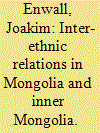| Srl | Item |
| 1 |
ID:
097813


|
|
|
|
|
| Publication |
2010.
|
| Summary/Abstract |
The article deals with the development of minority policies in Mongolia since independence from China, and focuses on the effects that these policies have had on inter-ethnic relations. The main groups studied are the Khalkha Mongols, the Kazakhs, the Tuvans and the Han Chinese. The definitions of these groups as either u ndesten or yastan have also varied over time, which has created theoretically interesting complexities. The article contains a sociolinguistic study of the inter-ethnic relations, with particular emphasis on education, culture, media and publishing. Furthermore, the tendency of the Tuvans to identify ethnically with the Mongols rather than with the Kazakhs is analyzed from the point of view of a sub-minority-majority identification theory. In Inner Mongolia, the inter-ethnic relations are problematic, and there are also severe tensions between the Mongols of Inner Mongolia and those of Mongolia. These ethnic policies have also played an important role in the development of the inter-state relations between Mongolia and the People's Republic of China.
|
|
|
|
|
|
|
|
|
|
|
|
|
|
|
|
| 2 |
ID:
190981


|
|
|
|
|
| Summary/Abstract |
This article investigates the socio-linguistic and pragmatic functions of Jordanian political humour after the Arab Spring revolutions from the perspective of Mikhail Bakhtin’s theory of carnival and the carnivalesque (folk humour). The analysis undertaken here of Jordanian political humour reveals a peculiar use of carnivalesque political humour via the use of humour as a socio-linguistic and pragmatic device that allows the ridicule of the government but not of the monarch. This occurs through the use of (1) conversational implicature, (2) rhetorical question, (3) malapropism, (4) taboo language and (5) reference and inference. This humour appears to be a form of ‘licensed disruption,’ an idea that is used extensively by some scholars of Bakhtin to talk about the popular politics of resistance and its limits and targets – what can and cannot be said within legal frameworks and societal expectations. Such humour, I found, has constantly called for reform of the government but not for regime change or revolution and has led to significant socio-political changes in Jordanian society, through which people are more willing to criticise and mock the government in social media platforms, such as Facebook.
|
|
|
|
|
|
|
|
|
|
|
|
|
|
|
|